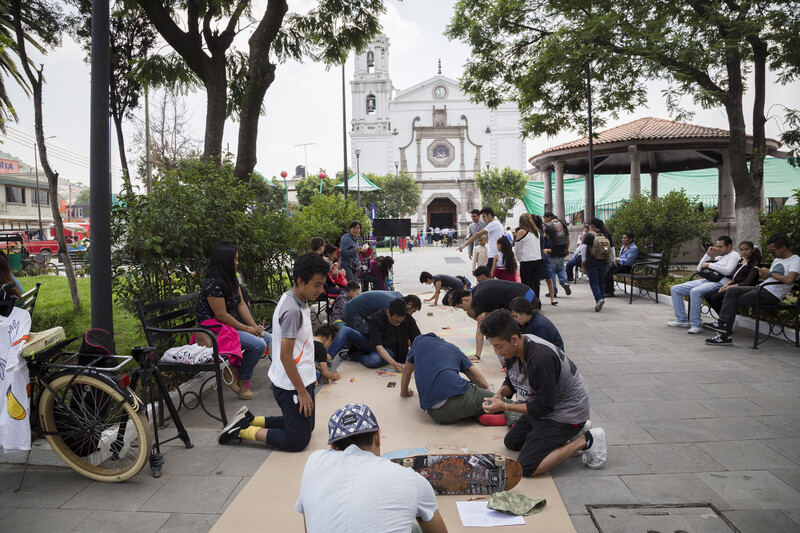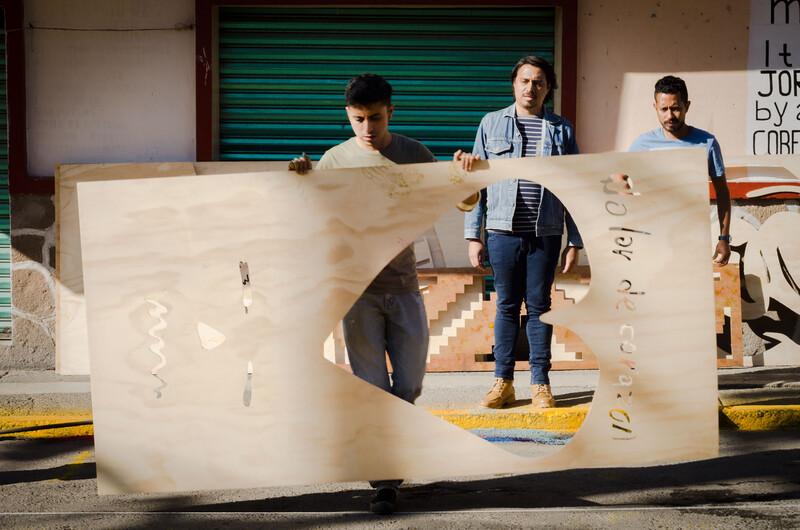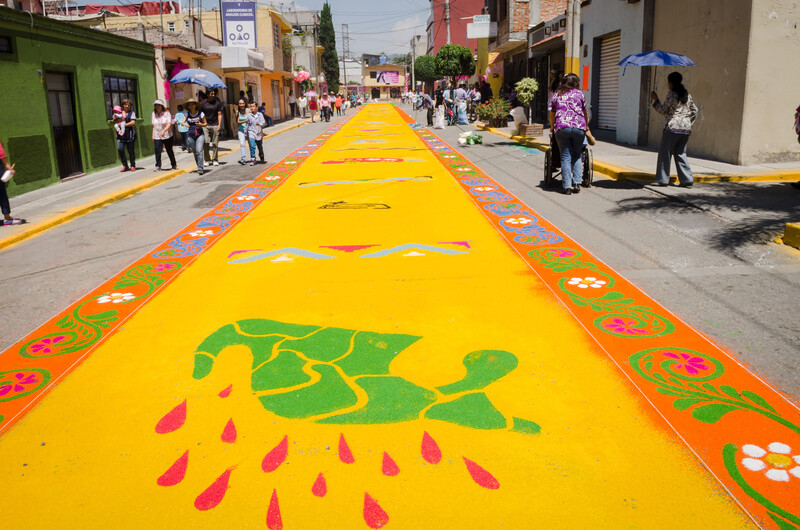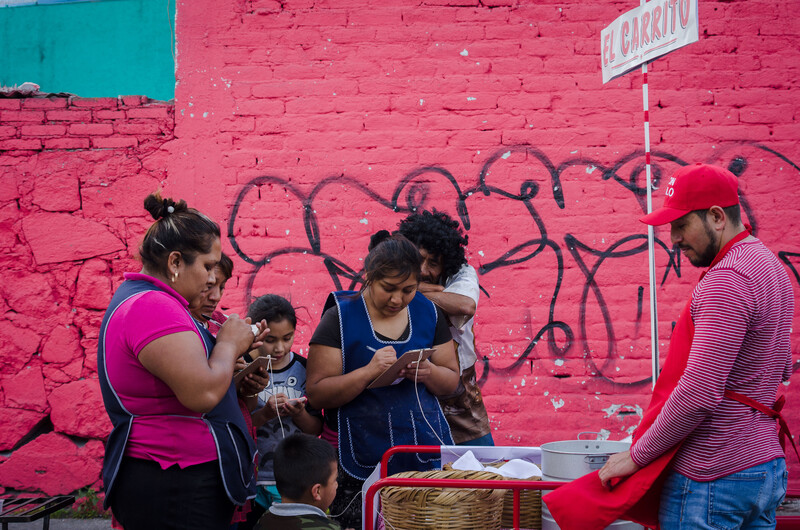- 15.0Cover
- 15.1How to Read this Broadsheet
- 15.2Variations on IdiorrhythmyHeather Kai Smith
- 15.3Thresholds of ResistanceIlya Vidrin
- 15.4The Archive and UsVania Gonzalvez Rodriguez, mother tongues
- 15.5Coral VisionJess Watkin
- 15.6Casting Our Kino-Eyes Over the Collective HorizonThe Post Film Collective
- 15.7KOMQWEJWI'KASIKL 2Michelle Sylliboy
- 15.8Animating Myths to Protect EcologyPerformance RAR
- 15.9Embodying Ancestral LoveTasha Beeds, Quill Christie-Peters
- 15.10Meal of Choicesquori theodor
- 15.11The Pussy Palace Oral History ProjectElspeth Brown, Alisha Stranges
- 15.12In Search of Lost ConfidenceTonatiuh López
- 15.13En Busca de la Confianza PerdidaTonatiuh López
- 15.14Local Useful Knowledge
- 15.15Glossary
In Search of Lost Confidence
- Tonatiuh López
In certain places, confiding won’t come easy. Insecurity, violence, and impunity make you feel afraid of faces that seem familiar. You never know where harm may come from. By the time we were orphaned, my sister was eighteen years old. I was living in Barcelona; she in Ecatepec de Morelos, Mexico, the place where we both grew up. Ecatepec is one of the most precarious and overpopulated municipalities in all of Latin America, and is considered to have the highest rate of violence toward women in Mexico.11Bautista, Nidia. Surviving One of Mexico’s Deadliest Places for Women. Nacla, February, 4 2019, https://nacla.org/news/2019/02/04/surviving-one-mexico%E2%80%99s-deadliest-places-women. 9000 km away from my sister, one thing worried me above all others: her being alone in such a city.
Back then, I remember waking up one night feeling troubled after a weird dream. I was trapped inside a car during rush hour. I knew from the noise and lights around me that I was on the road from Indios Verdes22A multi-modal, public transit station in Mexico City with the majority of routes that head for the city’s northern municipalities. to Ecatepec. Suddenly, a strident chorus of horns from the neighbouring cars sounded in unison: TOOOOOOOOT! TOOOOOOOOT!, as if summoning everyone to a ritual. A white unicorn then emerged. Neighing furiously, "HEEEE!” “HEEEE!,” it galloped at full speed through the cars. “Clop, clippity, clop, clop!”—its eyes laden with blood. I was transported to a wasteland where a crowd of people stood motionless. Flanked by patrol cars that cast a red-and-blue glow over the scene, the unicorn remained white and luminous, standing above a pile of dead plants and rubbish. Its hooves were nestled inside a black garbage bag, in which laid what we all knew was the body of yet another dismembered young woman.33I say “yet another” because even though the vision is from a dream, it's common that such findings occur in Ecatepec on a daily basis.
I woke up agitated and sweaty from the dream. A couple of nights before, I had a call with my sister where she told me the story of a friend who went missing. I felt guilty for not being near my sister to look after her. Instinctively, I grabbed my cellphone and googled “mujeres Ecatepec” (“women Ecatepec”), as if expecting to find something that offered hope and peace. Quite the opposite happened. The first article to appear in the news had this fatalistic headline: “What is it like to live in the worst place to be a woman in Mexico.”44Alberto Nájar and Juan Paullier, “Ecatepec: cómo es vivir en el peor lugar para ser mujer de todo México”, BBC News Mundo, 21 September, 2015, recovered on 02/28/2023 from: https://www.bbc.com/mundo/noticias/2015/09/150831_mexico_feminicidios_ecatepec_violencia_mujeres_jp. I clicked. The article, written by two men, told the harsh realities that relatives of femicide victims face: “It is a place where the horror of an easy death, contempt for women, general insecurity and impunity are combined.”55Ibid. I couldn’t go back to sleep. I remember closing my eyes and praying to my version of god to look after my sister, to keep her always safe. I didn’t have—and I still don't have—any choice but to trust him.

It has been a long time since the physical distance between my sister and I shortened. Shortly after that dream, I came back to Mexico and joined the Museo Arte Contemporáneo Ecatepec (MArCE), a collective formed by artists Federico Martínez, Antonio Barrientos, Iván Massé, and the activists Mariana García and Salvador Vásquez. Originally, MArCE was born as an ironic institution that aimed to fill the lack of cultural spaces and institutions for both the artists and public in the region. MArCE is dedicated to creating community art interventions with and for the people of Ecatepec. Since our formation in 2015, we have been concerned with the situation of women and feminized bodies in this and other similar places.
Generally, when media and authorities talk about gender-based violence and femicide in Ecatepec, the immediate solution is to retire feminized bodies from the public sphere and confine them to domestic spaces under the subjugation of men. We knew we needed to do something to help them reclaim their space and agency. It was clear that we could not rely on the government, the police, or other institutions—and that there were ways in which the community could recover their lost confidence. It has been a part of our work to help them rebuild it through actions that reassemble our social bonds and a sense of care for each other.

MArCE’s programs reinforce the participation and visibility of feminized bodies. As Ecatepec holds the highest insecurity perception index in the whole country, our projects also endeavour to create safe and empowering environments for the community. These include movie projections that light up the night, interactive neighbourhood walks, and interventions like Toco Madera,66Toco madera (“touching wood”) is a popular Mexican saying used when invoking a problem you want to move away from. a collective and monumental ex-voto of coloured sawdust for the celebrations of the Virgin of Santa Clara. Painting the streets with representations of what the community considered to be the main issues of the town, the project was conducted in three stages. First, we collected letters from the community in exchange for bread from a local panadería through an action called Las penas con pan son menos (Troubled Times with Bread Are Lesser) with support from Adriana Valdéz’s project, El Carrito. We then held a drawing marathon where people, especially children, helped us translate the testimonials into graphic forms, which were then recreated as stencils for the ex-voto rug. As the Virgin passed over the sawdust-clad streets during the traditional procession, the community’s problems were symbolically erased. Toco Madera gave the community agency to vocalize their concerns, while showing that self-determined organizing can lead to change.
In line with these actions, MArCE hosted the Laboratory of Intersectional Journalism for Women and Feminized Bodies from Ecatepec in 2021. This public program of workshops on writing, journalism, photography, and graphic arts provided tools for individuals to tell their own stories, reaffirm their positionality, and challenge the media’s editorializing of their perspectives. As a result of this program, La Vigilanta, a print periodical that collects the work of over twenty women and sexually dissident bodies from Ecatepec and other places understood as peripheral, will launch in the summer of 2023. A public installation that involves placing lit candles in the darkest streets will support the mourning relatives of murdered and missing women, while lighting the way for vulnerable bodies who move through those spaces.

It is true; in certain places, confidence seems lost. During precarious times, we might appeal to our version of god to feel safe; but, we can also appeal to each other, spend time together, share our concerns, and work to create new discourses and ways to defend our loved ones. Although rewriting the statistics seems impossible, holding space for discussion and relationship building with community members becomes very important when safe, public spaces are in short supply. For those bodies whose lives seem denied, confidence is hard to find. But, the worst place to be a woman is also the best scenario to start a fight. We are sure of one thing, our search for freedom and respect will not stop and, for now, this reborn sense of confidence is enough to guide us along the way. “HEEEEEEEE!” Clop, clippity, clop, clop. “HEEEEEEEE!”

Spanish translation by Miguel Ángel García Covarrubias.
Tonatiuh López (born Ecatepec, 1989) is an independent curator, writer, and editor. His practice is marked by the intention of summing up art and life, both with poetic gestures and through the realization of socially engaged art projects. Since 2016, he has been a member of MArCE. Tonatiuh is also an activist for the love and sexual freedom of the communities of men who have sex with other men and people who use drugs. He lives and works in Mexico City and Ecatepec.
See Connections ⤴